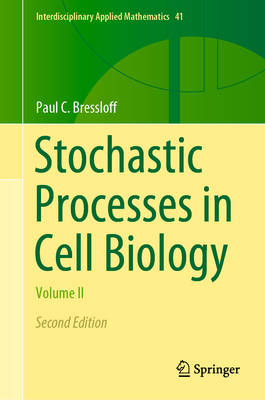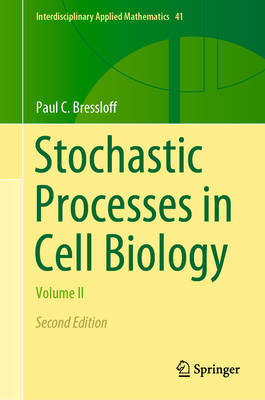
- Retrait gratuit dans votre magasin Club
- 7.000.000 titres dans notre catalogue
- Payer en toute sécurité
- Toujours un magasin près de chez vous
- Retrait gratuit dans votre magasin Club
- 7.000.0000 titres dans notre catalogue
- Payer en toute sécurité
- Toujours un magasin près de chez vous
Description
This book develops the theory of continuous and discrete stochastic processes within the context of cell biology. In the second edition the material has been significantly expanded, particularly within the context of nonequilibrium and self-organizing systems. Given the amount of additional material, the book has been divided into two volumes, with volume I mainly covering molecular processes and volume II focusing on cellular processes.
A wide range of biological topics are covered in the new edition, including stochastic ion channels and excitable systems, molecular motors, stochastic gene networks, genetic switches and oscillators, epigenetics, normal and anomalous diffusion in complex cellular environments, stochastically-gated diffusion, active intracellular transport, signal transduction, cell sensing, bacterial chemotaxis, intracellular pattern formation, cell polarization, cell mechanics, biological polymers and membranes, nuclear structure and dynamics, biological condensates, molecular aggregation and nucleation, cellular length control, cell mitosis, cell motility, cell adhesion, cytoneme-based morphogenesis, bacterial growth, and quorum sensing. The book also provides a pedagogical introduction to the theory of stochastic and nonequilibrium processes - Fokker Planck equations, stochastic differential equations, stochastic calculus, master equations and jump Markov processes, birth-death processes, Poisson processes, first passage time problems, stochastic hybrid systems, queuing and renewal theory, narrow capture and escape, extreme statistics, search processes and stochastic resetting, exclusion processes, WKB methods, large deviation theory, path integrals, martingales and branching processes, numerical methods, linear response theory, phase separation, fluctuation-dissipation theorems, age-structured models, and statistical field theory. This text is primarily aimed at graduate students and researchers working in mathematical biology, statistical and biological physicists, and applied mathematicians interested in stochastic modeling. Applied probabilists should also find it of interest. It provides significant background material in applied mathematics and statistical physics, and introduces concepts in stochastic and nonequilibrium processes via motivating biological applications. The book is highly illustrated and contains a large number of examples and exercises that further develop the models and ideas in the body of the text. It is based on a course that the author has taught at the University of Utah for many years.
A wide range of biological topics are covered in the new edition, including stochastic ion channels and excitable systems, molecular motors, stochastic gene networks, genetic switches and oscillators, epigenetics, normal and anomalous diffusion in complex cellular environments, stochastically-gated diffusion, active intracellular transport, signal transduction, cell sensing, bacterial chemotaxis, intracellular pattern formation, cell polarization, cell mechanics, biological polymers and membranes, nuclear structure and dynamics, biological condensates, molecular aggregation and nucleation, cellular length control, cell mitosis, cell motility, cell adhesion, cytoneme-based morphogenesis, bacterial growth, and quorum sensing. The book also provides a pedagogical introduction to the theory of stochastic and nonequilibrium processes - Fokker Planck equations, stochastic differential equations, stochastic calculus, master equations and jump Markov processes, birth-death processes, Poisson processes, first passage time problems, stochastic hybrid systems, queuing and renewal theory, narrow capture and escape, extreme statistics, search processes and stochastic resetting, exclusion processes, WKB methods, large deviation theory, path integrals, martingales and branching processes, numerical methods, linear response theory, phase separation, fluctuation-dissipation theorems, age-structured models, and statistical field theory. This text is primarily aimed at graduate students and researchers working in mathematical biology, statistical and biological physicists, and applied mathematicians interested in stochastic modeling. Applied probabilists should also find it of interest. It provides significant background material in applied mathematics and statistical physics, and introduces concepts in stochastic and nonequilibrium processes via motivating biological applications. The book is highly illustrated and contains a large number of examples and exercises that further develop the models and ideas in the body of the text. It is based on a course that the author has taught at the University of Utah for many years.
Spécifications
Parties prenantes
- Auteur(s) :
- Editeur:
Contenu
- Nombre de pages :
- 698
- Langue:
- Anglais
- Collection :
- Tome:
- n° 41
Caractéristiques
- EAN:
- 9783030725181
- Date de parution :
- 11-01-22
- Format:
- Livre relié
- Format numérique:
- Genaaid
- Dimensions :
- 165 mm x 241 mm
- Poids :
- 1406 g

Les avis
Nous publions uniquement les avis qui respectent les conditions requises. Consultez nos conditions pour les avis.






